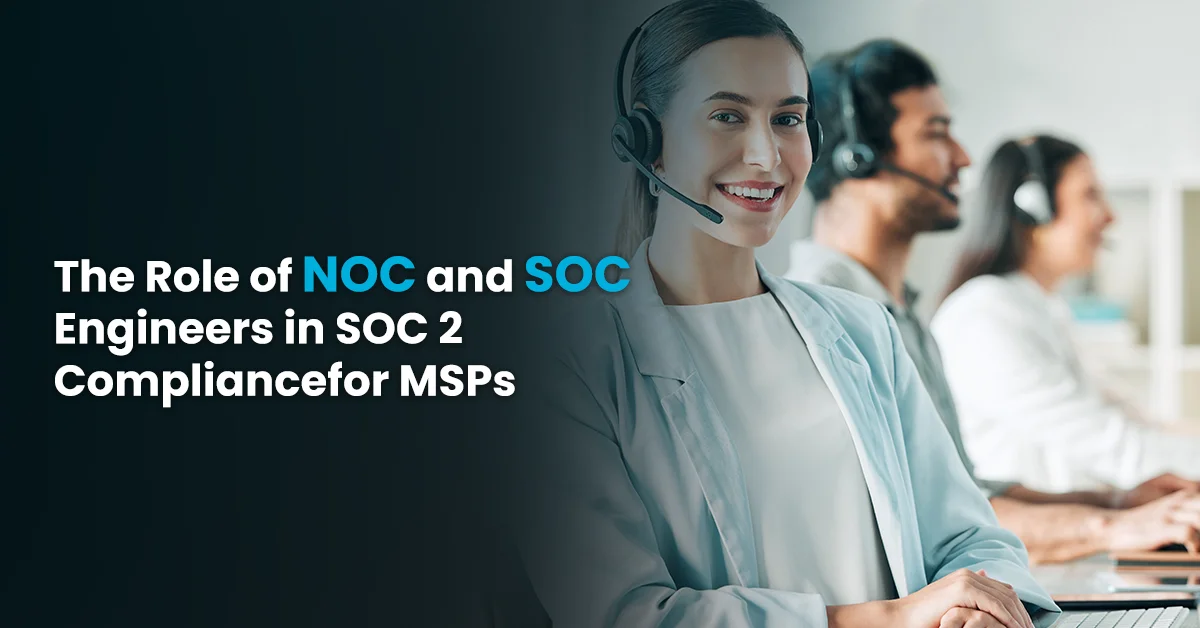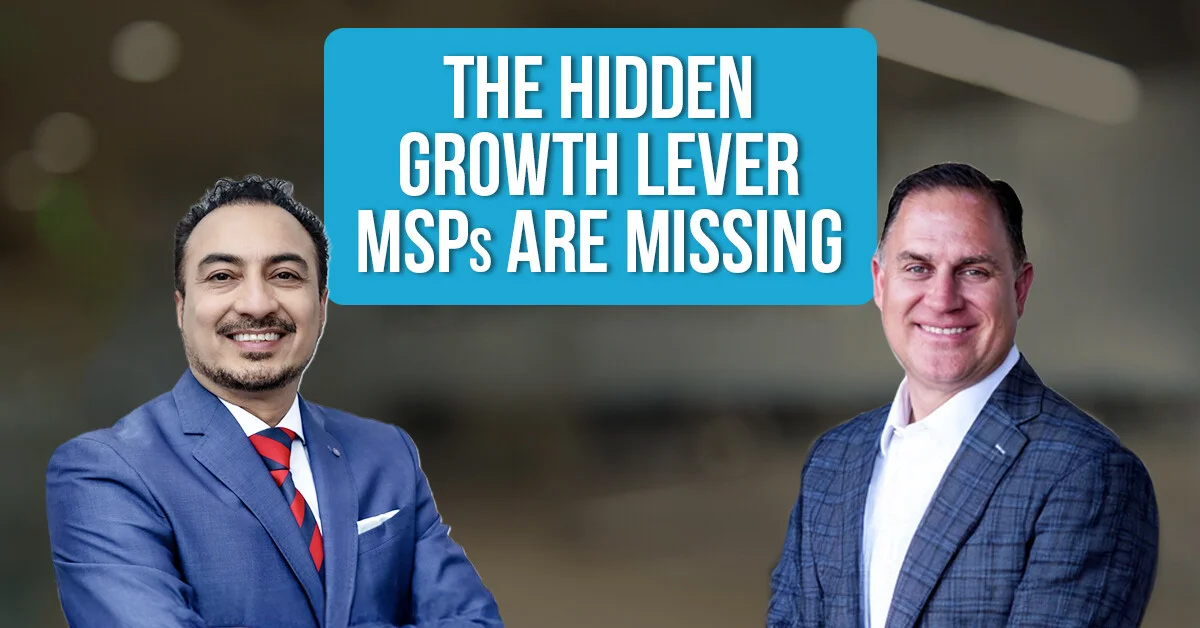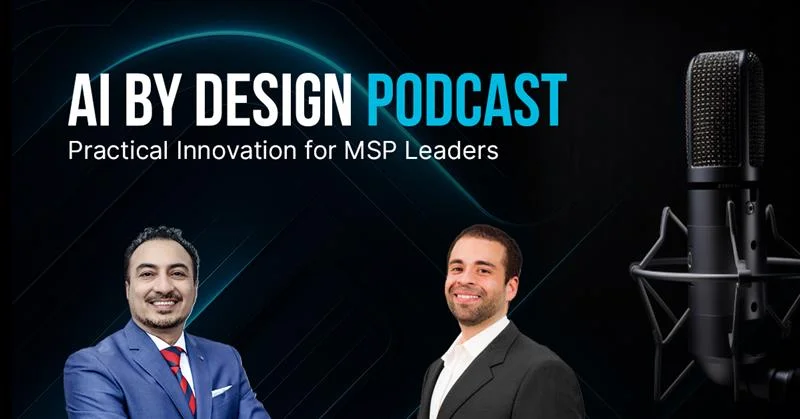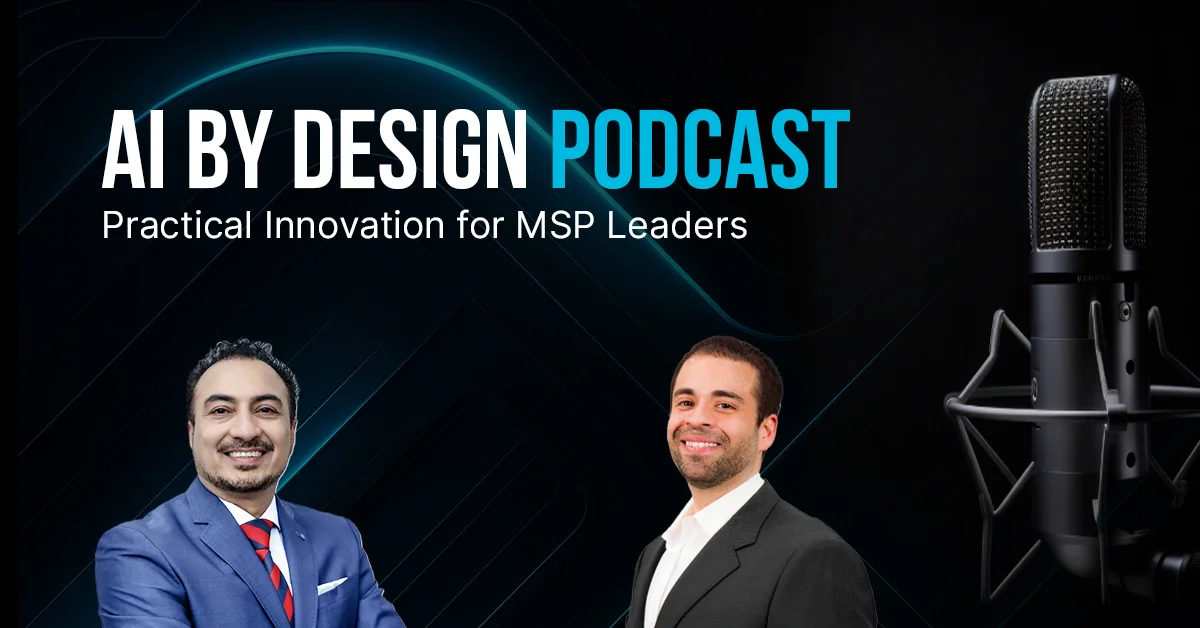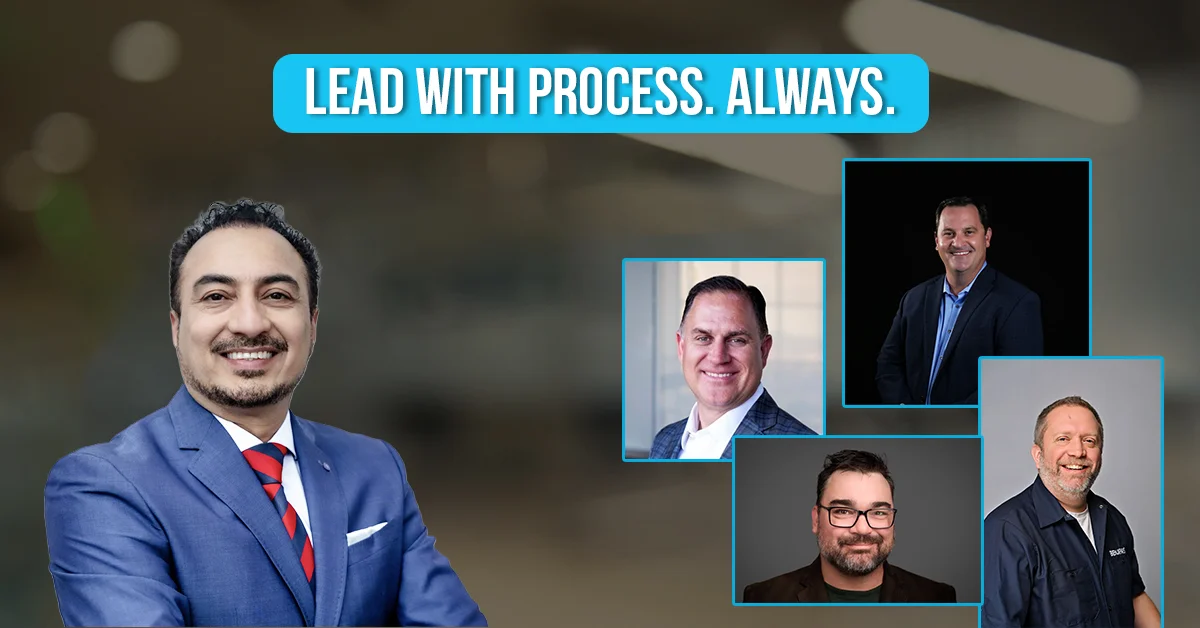SOC 2 adoptions rose 40% in 2024. That’s not a gradual increase; that’s a market shift. Clients aren’t just asking if you have SOC 2 compliance anymore. They’re requiring it before they’ll even talk contracts. And here’s what separates MSPs who pass audits from those who struggle: SOC engineers who know exactly what auditors want to see.
Here’s the reality: achieving and maintaining SOC 2 compliance without specialized technical teams is like trying to build a skyscraper without engineers. You might have great blueprints, but execution falls apart without the right expertise. That’s where SOC engineers and NOC engineers become non-negotiable for MSPs serious about compliance and growth.
What Are SOC Engineers and Why Do MSPs Need Them?
SOC engineers are your frontline defense against the chaos of modern cyber threats. They’re not your typical IT generalists; they’re security specialists who live and breathe threat detection, incident response, and compliance documentation.
Defining the Role of SOC Engineers in Modern IT Security
SOC engineers handle the security operations that keep MSPs and their clients protected. Their day-to-day includes:
- Real-time threat monitoring using SIEM platforms like Splunk or Microsoft Sentinel
- Investigating security incidents and coordinating responses
- Managing vulnerability scans and remediation tracking
- Documenting every security event for audit purposes
The specialized focus of SOC engineers on security makes them essential for MSP SOC 2 support. While your general IT team might know networking or servers, SOC engineers understand attack patterns, threat intelligence, and how to prove to auditors that your security controls actually work.
How SOC Engineers Support MSP SOC 2 Compliance Requirements
SOC 2 compliance revolves around five Trust Service Criteria: Security, Availability, Processing Integrity, Confidentiality, and Privacy. SOC engineers own the Security criterion—the only mandatory component for every SOC 2 audit.
Their role in MSP SOC 2 support includes:
- Implementing access controls (MFA, role-based permissions, least privilege)
- Deploying and managing security tools (EDR, firewalls, intrusion detection)
- Creating incident response playbooks
- Maintaining the audit trail that auditors demand to see
According to UnderDefense estimates, the total cost of SOC 2 Type 1 preparation and certification is $91,000 for companies with less than 50 employees and $186,000 for companies with 50 to 250 employees. Having SOC engineers who can implement controls correctly the first time saves massive rework and audit failures.
The Growing Demand for SOC Engineers in Co-Managed IT Models
Co-managed IT is changing how MSPs deliver services. Instead of taking over everything, co-managed IT means partnering with client internal teams and that partnership requires coordination.
SOC engineers excel in co-managed IT environments because they can:
- Work alongside client IT teams without stepping on toes
- Provide specialized security expertise clients lack internally
- Scale support across multiple clients simultaneously
- Maintain consistent security standards regardless of client infrastructure
The flexibility of co-managed IT with dedicated SOC engineers gives MSPs a competitive edge. You’re not just offering security; you’re offering expertise that most small and mid-size businesses can’t afford to hire full-time.
What Do NOC Engineers Contribute to SOC 2 Compliance?
While SOC engineers protect against threats, NOC engineers make sure everything keeps running. Both roles are critical for complete SOC 2 compliance.
Understanding the NOC Engineer’s Role in Infrastructure Management
NOC engineers focus on network health, system uptime, and infrastructure reliability. They’re the ones monitoring:
- Server performance and capacity
- Network traffic and bandwidth
- Backup verification and disaster recovery testing
- Patch management and system updates
For SOC 2 compliance, NOC engineers directly support the “Availability” criterion. Auditors want proof that your systems are accessible, reliable, and properly maintained. That’s NOC engineers territory.
How NOC Engineers and SOC Engineers Work Together for Compliance
Here’s where it gets interesting. NOC engineers and SOC engineers need each other. A network problem might be a performance issue or a security incident—and figuring out which requires collaboration.
Smart MSP SOC 2 support includes clear escalation protocols:
- NOC engineers spot unusual traffic patterns or system behavior
- They escalate potential security issues to SOC engineers
- SOC engineers investigate and determine if it’s malicious
- Both teams document their findings for compliance evidence
This partnership is what separates excellent co-managed IT providers from mediocre ones. Clients get comprehensive coverage without paying for redundant roles.
Why MSPs Need Both NOC and SOC Engineers for Complete Coverage
Relying on one team alone creates dangerous gaps. NOC engineers without security training might miss breach indicators. SOC engineers without infrastructure knowledge might overlook availability issues that violate SLAs.
Over half (54%) of cybersecurity professionals say the impact of the talent shortage has worsened over the past two years, according to Fortinet’s 2024 Cybersecurity Skills Gap Report. That makes having both specialized teams even more valuable—you can’t just cross-train everyone and hope for the best.
How Do SOC Engineers Implement Security Controls for SOC 2 Compliance?
Security controls aren’t theoretical; they’re technical implementations that SOC engineers build and maintain every day.
Essential Security Controls SOC Engineers Must Deploy
SOC engineers implementing MSP SOC 2 support focus on these non-negotiables:
- Access control systems: Multi-factor authentication, privileged access management, and session monitoring
- Security monitoring tools: SIEM for log aggregation, EDR for endpoint protection, and vulnerability scanners
- Incident response systems: Documented playbooks, ticketing integration, and escalation procedures
- Data protection: Encryption at rest and in transit, secure key management
Each control needs documentation proving it exists, works correctly, and gets monitored continuously. That’s where SOC engineers earn their keep; they don’t just implement tools, they create the paper trail auditors require.
What Documentation and Evidence Do SOC Engineers Maintain?
Auditors love evidence. SOC engineers spend significant time maintaining:
- Security event logs with proper retention periods
- Incident response reports showing how threats were handled
- Change management records proving controlled updates
- Access reviews demonstrating least privilege enforcement
This documentation burden is why experienced SOC engineers are worth their weight in gold for SOC 2 compliance. They understand what auditors want to see before auditors ask for it.
How SOC Engineers Support MSP SOC 2 Support During Audits
When audit time arrives, SOC engineers become your audit liaisons. They:
- Provide technical documentation in formats auditors expect
- Answer technical questions about security implementations
- Demonstrate controls working in real-time
- Explain remediation for any identified gaps
What Makes Co-Managed IT the Ideal Model for SOC 2 Compliance?
Co-managed IT solves the resource constraint problem most MSPs face when pursuing SOC 2 compliance.
How Co-Managed IT Combines Internal and MSP Resources
Co-managed IT isn’t about replacing client IT teams. It‘s about augmenting them with specialized expertise. The model works like this:
- Client IT handles day-to-day operations and user support
- MSP provides SOC engineers and NOC engineers for specialized work
- Both teams collaborate using shared tools and communication platforms
- Responsibilities are clearly documented for compliance purposes
This approach lets smaller MSPs compete with larger providers. You don’t need 50 engineers on staff—you need the right specialists supporting multiple clients efficiently.
Why MSP SOC 2 Support Works Better in Co-Managed Environments
Co-managed IT delivers better MSP SOC 2 support for several reasons:
- Client teams provide context about business processes and systems
- SOC engineers bring security expertise clients lack
- NOC engineers offer 24/7 monitoring clients can’t staff internally
- Combined knowledge catches issues faster than siloed teams
The integration means better security, lower costs, and cleaner audit results. Everyone wins.
How NOC Engineers Enable 24/7 Monitoring in Co-Managed IT
Most clients can’t justify full-time NOC engineers internally. But they absolutely need 24/7 monitoring for SOC 2 compliance.
Co-managed IT solves this by pooling NOC engineers across multiple clients. Your clients get:
- Round-the-clock infrastructure monitoring
- Immediate response to critical alerts
- Proactive capacity planning and optimization
- Professional escalation to SOC engineers when needed
This is how MSPs deliver enterprise-grade MSP SOC 2 support at prices mid-market companies can actually afford.
How Can MSPs Build Effective SOC and NOC Teams?
Building specialized teams isn’t just about hiring, it’s about creating systems that scale.
Essential Skills and Certifications for SOC Engineers
Quality SOC engineers come with credentials proving their expertise:
- Security certifications: CISSP, CEH, GCIA, Security+, CySA+
- Technical skills: SIEM administration, threat hunting, digital forensics, compliance frameworks
- Soft skills: Clear communication with non-technical stakeholders, thorough documentation habits
The best SOC engineers for MSP SOC 2 support understand both security and business. They can explain risk in terms executives understand and document controls in ways auditors appreciate.
What NOC Engineers Need to Support SOC 2 Compliance
NOC engineers need different but equally important skills:
- Network certifications: CCNA, Network+, ITIL Foundation
- Infrastructure expertise: Virtualization platforms, cloud services, backup systems
- Compliance awareness: Understanding how availability and performance impact SOC 2 compliance
Cross-training between NOC engineers and SOC engineers creates more valuable team members. When NOC engineers understand security basics and SOC engineers grasp infrastructure fundamentals, collaboration improves dramatically.
Building a Unified Team for MSP SOC 2 Support
The magic happens when NOC engineers and SOC engineers function as one cohesive unit supporting co-managed IT clients:
- Shared communication platforms (Slack, Teams, ticketing systems)
- Joint training sessions on compliance requirements
- Documented escalation procedures everyone follows
- Regular reviews of audit readiness across all clients
This unified approach transforms MSP SOC 2 support from a compliance burden into a competitive differentiator.
What Challenges Do SOC Engineers Face in MSP Environments?
Real talk: being a SOC engineer in an MSP environment is harder than working for a single company.
Multi-Tenant Security Complexity
SOC engineers managing MSP SOC 2 support juggle multiple challenges simultaneously:
- Different security tools across different clients
- Varying compliance requirements beyond standard SOC 2 compliance
- Client-specific policies and procedures
- Keeping context straight when alerts come from 20+ environments
The best SOC engineers develop systems to manage this complexity—standardized playbooks, detailed client documentation, and ruthless prioritization of what matters most.
Resource Constraints and Scaling Issues
Over half (54%) of cybersecurity professionals say the impact of the talent shortage has worsened. Finding qualified SOC engineers is brutal. Training new ones takes months. Retaining experienced ones requires competitive compensation.
Meanwhile, client demands keep growing and SOC 2 compliance requirements keep evolving. Co-managed IT models help by distributing SOC engineer expertise across multiple clients, but staffing remains an ongoing challenge.
Keeping Pace with Evolving Compliance Requirements
SOC 2 compliance isn’t static. In 2024, 64.4% of SOC 2 reports included confidentiality as an in-scope category, up from 34% in 2023. That’s a massive shift in just one year.
SOC engineers and NOC engineers must continuously learn about:
- New threat vectors and attack techniques
- Updated compliance framework requirements
- Emerging security tools and technologies
- Industry-specific regulations affecting clients
The learning never stops. That’s why partnering with established providers who invest in continuous training makes sense for many MSPs.
Achieve SOC 2 Compliance with IT By Design’s SOC Services
SOC 2 compliance isn’t optional anymore; it’s the price of admission for serious B2B relationships. But achieving it without the right team is expensive, time-consuming, and fraught with risk.
The challenges are real: multi-tenant security complexity, resource constraints, evolving requirements, and the constant pressure to deliver comprehensive MSP SOC 2 support. Handling this alone leaves your MSP vulnerable to compliance failures, client dissatisfaction, and competitive disadvantage.
Stop struggling with compliance gaps and resource constraints.
IT By Design’s SOC Services give you immediate access to certified SOC engineers and experienced NOC engineers who specialize in MSP environments. Our co-managed IT model delivers the expertise, processes, and continuous support you need for SOC 2 success, without the cost and complexity of building your own compliance team.
Whether you’re pursuing your first certification or maintaining compliance across dozens of clients, we provide the scalable resources that grow with your business.
Schedule a call with us today to discover how our proven approach transforms SOC 2 compliance from a burden into a competitive advantage. Your clients demand it. IT By Design delivers the team that makes it happen.
FAQs (Frequently Asked Questions)
Q: What is the main difference between SOC engineers and NOC engineers?
SOC engineers focus on security; threat detection, incident response, and protecting against cyberattacks, while NOC engineers concentrate on network performance, uptime, and infrastructure availability for comprehensive MSP SOC 2 support.
Q: Do MSPs need both NOC and SOC engineers for SOC 2 compliance?
Yes, SOC 2 compliance requires security controls from SOC engineers and availability management from NOC engineers to meet all Trust Service Criteria effectively and provide complete MSP SOC 2 support.
Q: How do SOC engineers help with MSP SOC 2 compliance audits?
SOC engineers maintain security documentation, implement required controls, collect audit evidence, monitor compliance continuously, and provide technical expertise during auditor reviews to ensure successful SOC 2 compliance certification.
Q: What is co-managed IT and how does it relate to SOC 2 compliance?
Co-managed IT is a partnership where client IT teams collaborate with MSP resources, including SOC engineers and NOC engineers, to share compliance responsibilities and leverage specialized expertise for more effective and affordable SOC 2 compliance.

